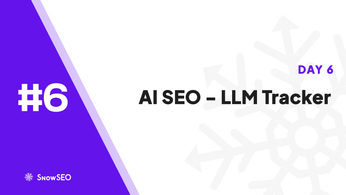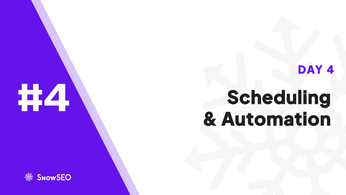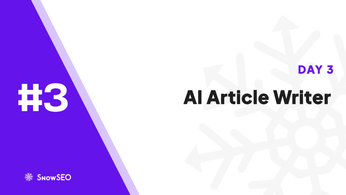
Compare SEO Automation Tools to Boost Agency ROI
Table of Contents
In today’s digital landscape, search engine optimization (SEO) is pivotal for agencies aiming to enhance online visibility and drive client success. However, the complexity and time-intensive nature of SEO tasks can strain resources and hinder efficiency. This challenge underscores the growing importance of SEO automation tools, which streamline processes and amplify return on investment (ROI).
SEO automation tools are designed to handle repetitive tasks such as keyword research, on-page optimization, and performance tracking. By automating these processes, agencies can allocate more time to strategic planning and creative initiatives, thereby improving overall productivity. According to a study published in the International Journal of Engineering Research & Technology, effective SEO practices significantly enhance website traffic and brand exposure through non-paid search engine results. (ijert.org)
Moreover, the University of Kent emphasizes that SEO can be improved by making content as relevant as possible, including the use of appropriate tags, page titles, categories, and keywords. Enhancing user experience, particularly ease of use and page load speed, also plays a crucial role in optimizing a site’s ranking. (research.kent.ac.uk)
This article will explore various SEO automation tools, comparing their features, benefits, and how they can be leveraged to boost agency ROI. By understanding and implementing these tools, agencies can navigate the complexities of SEO more effectively, leading to improved client outcomes and business growth.
Ready to transform your agency’s ROI with smarter, faster, and more effective SEO automation? If you’ve been comparing SEO automation tools and searching for a solution that truly streamlines your workflow, SnowSEO is designed to be the game-changer you need. In today’s competitive digital landscape, agencies face mounting pressure to deliver measurable results, reduce manual effort, and stay ahead of evolving search and AI algorithms. SnowSEO directly addresses these challenges by unifying every critical aspect of SEO and AI-SEO into a single, intuitive platform.
Imagine eliminating the hassle of juggling multiple tools for keyword research, content creation, performance tracking, and competitor analysis. With SnowSEO, you gain access to a fully automated SEO pipeline that not only saves time but also ensures your strategies are always data-driven and up-to-date. The platform’s AI-powered content generation produces human-like, hyper-personalized articles optimized for both traditional search engines and emerging AI platforms like ChatGPT, Grok, Bing, Claude, and Google. This means your agency’s content is always ready to rank—no matter where your audience is searching.
SnowSEO’s seamless integration with popular CMS platforms allows you to publish optimized content effortlessly, while its 24x7 AI-powered expert team experience ensures you’re never left without support or insights. The platform’s advanced monitoring tools track your brand mentions across both search engines and AI platforms, providing you with weekly SEO and GEO reports that highlight opportunities and performance gaps. This level of automation and intelligence empowers your team to focus on strategy and creativity, rather than repetitive manual tasks.
What sets SnowSEO apart is its commitment to reducing complexity and cost. By consolidating all essential SEO functions into one platform, you can eliminate redundant subscriptions and manual processes, freeing up resources to invest in growth and client success. Whether you’re looking to discover untapped content gaps, optimize existing assets, or accelerate your agency’s organic growth, SnowSEO provides the unified solution you need to outperform the competition.
Take the next step toward maximizing your agency’s ROI. Visit SnowSEO.com to explore how our all-in-one SEO and AI-SEO platform can revolutionize your approach to search and generative engine optimization. Sign up for a free trial or schedule a personalized demo to see firsthand how SnowSEO can help your agency deliver better results, faster. Don’t let outdated workflows hold you back—empower your team with the automation and intelligence of SnowSEO today.
Frequently Asked Questions
Q1: What are SEO automation tools, and how do they benefit digital marketing agencies?
SEO automation tools are specialized software platforms designed to streamline, simplify, and enhance various search engine optimization tasks that would otherwise require significant manual effort. These tools can handle a wide range of activities, including keyword research, site audits, backlink analysis, rank tracking, content optimization, and reporting. For digital marketing agencies, the primary benefit lies in efficiency—automation tools save countless hours by performing repetitive or data-heavy tasks quickly and accurately. This allows agency teams to focus on higher-level strategy, creative work, and client communication. Additionally, automation tools help reduce human error, ensure consistency in reporting, and provide real-time insights that can be acted upon immediately. By leveraging these platforms, agencies can scale their operations, manage more clients simultaneously, and ultimately deliver better results with fewer resources. The end result is a significant boost in productivity, improved client satisfaction, and a measurable increase in return on investment (ROI) for both the agency and its clients.
Q2: How do SEO automation tools improve ROI for agencies compared to manual SEO processes?
SEO automation tools improve ROI for agencies by dramatically reducing the time and labor costs associated with manual SEO tasks. When agencies rely on manual processes, activities like keyword tracking, competitor analysis, and technical audits can consume hours or even days, especially as client portfolios grow. Automation tools, on the other hand, can perform these tasks in minutes, freeing up valuable staff time for strategic planning and creative problem-solving. This efficiency translates directly into cost savings and allows agencies to take on more clients without increasing headcount. Furthermore, automation tools often provide deeper data insights and more accurate reporting, enabling agencies to make data-driven decisions that lead to better campaign performance. By identifying opportunities and issues faster, agencies can optimize campaigns in real time, leading to higher rankings, increased traffic, and better conversion rates. All these factors combine to deliver a stronger ROI, as agencies can achieve more with less, while also demonstrating clear, quantifiable results to their clients.
Q3: What features should agencies look for when comparing SEO automation tools?
When comparing SEO automation tools, agencies should prioritize features that align with their specific workflow and client needs. Key features to look for include comprehensive keyword research capabilities, robust site auditing functions, and advanced backlink analysis. Agencies should also seek tools that offer automated rank tracking, competitor benchmarking, and customizable reporting dashboards. Integration with other marketing platforms, such as Google Analytics and Google Search Console, is essential for a holistic view of campaign performance. Scalability is another critical factor—tools should be able to handle multiple projects and large datasets without performance issues. User-friendly interfaces and strong customer support can make a significant difference in day-to-day operations. Security and data privacy features are also important, especially when handling sensitive client information. Finally, agencies should consider the tool’s pricing structure, ensuring it fits within their budget while offering the flexibility to grow as their client base expands. By focusing on these features, agencies can select a tool that not only meets their current needs but also supports future growth.
Q4: Are there any risks or downsides to relying on SEO automation tools?
While SEO automation tools offer substantial benefits, there are some risks and downsides to consider. One potential issue is over-reliance on automation, which can lead to a lack of critical human oversight. Automated tools may miss nuanced issues or context-specific opportunities that an experienced SEO professional would catch. Additionally, some tools may generate generic recommendations that aren’t tailored to a specific industry or audience, leading to suboptimal results if followed blindly. There’s also the risk of data inaccuracies—if a tool’s algorithms are outdated or if it pulls from incomplete data sources, the insights provided may be misleading. Security and privacy concerns can arise if sensitive client data is stored or processed by third-party platforms without adequate safeguards. Finally, the cost of premium automation tools can be significant, especially for smaller agencies, and not all tools offer the same level of value. To mitigate these risks, agencies should use automation as a supplement to, not a replacement for, expert analysis and strategic thinking.
Q5: How do SEO automation tools handle updates to search engine algorithms?
SEO automation tools are designed to adapt to changes in search engine algorithms by regularly updating their software and data sources. Leading tool providers closely monitor updates from major search engines like Google and Bing, and they adjust their algorithms, crawling methods, and reporting features accordingly. This ensures that the insights and recommendations provided remain relevant and accurate in the face of evolving ranking factors. Many tools also offer real-time alerts or notifications when significant algorithm changes occur, helping agencies respond quickly to potential impacts on their clients’ rankings. However, it’s important to note that no tool can predict every nuance of a search engine update. Agencies should stay informed about industry news and best practices, and use automation tools as part of a broader strategy that includes ongoing education and manual review. By combining the speed and efficiency of automation with human expertise, agencies can navigate algorithm changes more effectively and maintain strong SEO performance for their clients.
Q6: Can SEO automation tools replace the need for human SEO experts?
SEO automation tools are powerful aids, but they cannot fully replace the need for human SEO experts. While these tools excel at handling repetitive, data-driven tasks and providing actionable insights, they lack the creativity, strategic thinking, and industry-specific knowledge that experienced professionals bring to the table. Human experts are essential for interpreting data in context, developing customized strategies, and adapting to unique client goals and challenges. They can also identify opportunities for innovation, craft compelling content, and build relationships with stakeholders—tasks that automation simply cannot replicate. The most successful agencies use automation tools to enhance their teams’ capabilities, not to replace them. By automating routine work, experts can focus on high-value activities that drive real business results. In short, automation tools are best viewed as partners that amplify human expertise, enabling agencies to deliver more effective, efficient, and creative SEO solutions for their clients.
Q7: How do agencies measure the effectiveness of SEO automation tools?
Agencies measure the effectiveness of SEO automation tools by tracking key performance indicators (KPIs) that reflect both operational efficiency and campaign outcomes. Common KPIs include time saved on routine tasks, the number of clients managed per team member, and the accuracy of automated reports. On the campaign side, agencies look at improvements in keyword rankings, organic traffic growth, conversion rates, and backlink acquisition. Many automation tools offer built-in analytics and reporting features that make it easy to monitor these metrics over time. Agencies may also conduct periodic audits to compare results achieved with and without automation, helping to quantify the value added by the tool. Client satisfaction and retention rates are additional indicators of success, as streamlined processes and better results typically lead to happier clients. Ultimately, the most effective tools are those that enable agencies to deliver measurable improvements in both efficiency and SEO performance, supporting sustainable growth and profitability.
Q8: What are some common challenges agencies face when implementing SEO automation tools?
Implementing SEO automation tools can present several challenges for agencies. One common issue is the learning curve associated with new software—team members may need time and training to become proficient with the tool’s features and workflows. Integration with existing systems can also be a hurdle, especially if the agency uses a variety of platforms for project management, analytics, and reporting. Data migration and compatibility issues may arise, requiring careful planning and technical support. Another challenge is ensuring that automation does not lead to a “set it and forget it” mentality; ongoing oversight and strategic input are still necessary to achieve the best results. Agencies may also encounter resistance to change from staff who are accustomed to manual processes. To overcome these challenges, agencies should invest in comprehensive onboarding, provide ongoing training, and foster a culture of continuous improvement. Selecting a tool with strong customer support and clear documentation can also make the transition smoother and more successful.
Q9: How do SEO automation tools support collaboration within agency teams?
SEO automation tools support collaboration within agency teams by centralizing data, streamlining workflows, and enabling real-time communication. Many tools offer shared dashboards, project management features, and role-based access controls, allowing team members to work together efficiently on client campaigns. Automated reporting and task assignment features help ensure that everyone stays on the same page and that deadlines are met. Some platforms integrate with popular communication tools, making it easy to share insights, updates, and recommendations across departments. By reducing the need for manual data entry and repetitive tasks, automation tools free up time for brainstorming, strategy sessions, and creative collaboration. This not only improves productivity but also fosters a more cohesive and motivated team environment. Ultimately, the ability to collaborate seamlessly leads to better campaign outcomes, higher client satisfaction, and a stronger agency culture.
Q10: Are there specific SEO automation tools recommended for agencies of different sizes?
Yes, there are SEO automation tools tailored to agencies of various sizes and needs. For small agencies or solo consultants, lightweight tools with essential features and affordable pricing are often the best fit. These platforms typically focus on core functions like keyword tracking, site audits, and basic reporting, making them easy to use and cost-effective. Mid-sized agencies may benefit from more comprehensive solutions that offer advanced analytics, competitor benchmarking, and integration with other marketing platforms. Large agencies or those managing enterprise clients often require robust, scalable tools with extensive customization options, API access, and support for large datasets. These platforms may also include advanced workflow automation, white-label reporting, and dedicated account management. When choosing a tool, agencies should consider their current client base, growth projections, and specific workflow requirements. Many providers offer free trials or demos, allowing agencies to test different options and find the best fit for their unique needs.
Q11: How do SEO automation tools help agencies stay competitive in a rapidly changing digital landscape?
SEO automation tools help agencies stay competitive by enabling them to respond quickly to changes in search engine algorithms, industry trends, and client demands. With real-time data analysis and automated alerts, agencies can identify opportunities and threats as they arise, allowing for rapid adjustments to strategy. Automation also frees up time for ongoing education and innovation, as teams are not bogged down by repetitive tasks. By delivering faster, more accurate insights, these tools empower agencies to make data-driven decisions that keep their clients ahead of the competition. Additionally, automation supports scalability, making it easier for agencies to take on new clients and expand their service offerings without sacrificing quality. In a digital landscape where speed, agility, and expertise are critical, SEO automation tools provide the foundation agencies need to thrive and grow.
Q12: What best practices should agencies follow to maximize the value of SEO automation tools?
To maximize the value of SEO automation tools, agencies should follow several best practices. First, invest in thorough training for all team members to ensure everyone can use the tool effectively. Regularly review and update workflows to take full advantage of automation features, and integrate the tool with other platforms for a seamless data ecosystem. Set clear goals and KPIs to measure the impact of automation on both efficiency and campaign performance. Maintain a balance between automation and human oversight—use the tool to handle routine tasks, but rely on expert analysis for strategy and decision-making. Stay informed about updates and new features, and participate in user communities or forums to share insights and learn from others. Finally, solicit feedback from clients and team members to continuously refine processes and deliver the best possible results. By following these practices, agencies can unlock the full potential of SEO automation tools and drive sustained success for their clients and their business.
Conclusion
In the rapidly evolving digital landscape, SEO automation tools have become indispensable for agencies aiming to enhance their return on investment (ROI). These tools streamline various aspects of search engine optimization, from keyword research to performance analytics, enabling agencies to allocate resources more efficiently and achieve superior outcomes.
The integration of artificial intelligence (AI) into SEO practices has further revolutionized the field. AI-driven tools can analyze vast datasets, predict trends, and automate complex tasks, thereby improving the accuracy and effectiveness of SEO strategies. For instance, AI-powered content optimization platforms can suggest relevant keywords and content structures that align with current search engine algorithms, enhancing content visibility and engagement.
However, while automation offers numerous benefits, it’s crucial for agencies to maintain a balance between automated processes and human oversight. Automated tools can handle repetitive tasks and data analysis, but strategic decision-making, creative content creation, and nuanced understanding of audience behavior still require human expertise.
To maximize ROI, agencies should:
- Evaluate and select tools that align with their specific needs and objectives.
- Invest in training to ensure team members can effectively utilize these tools.
- Continuously monitor and adjust strategies based on performance metrics and evolving SEO trends.
By thoughtfully integrating SEO automation tools with human insight, agencies can enhance their efficiency, stay competitive, and drive substantial growth in the digital marketplace.





